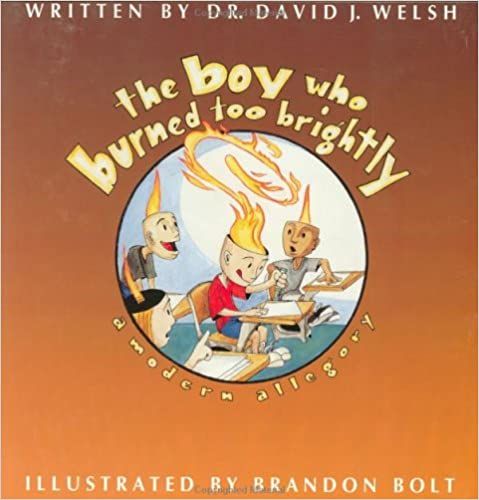
The Boy Who Burned Too Brightly
This book is an excellent resource for parents, teachers, school counselors and anyone that works with children. It is an allegorical tale that paints an excellent picture of what it’s like for children diagnosed with ADD, ADHD and other psychiatric labels, and how these children are treated in the school system. The Boy Who Burned Too Brightly, written by David J. Welsh, is a fiction story about a town where everyone has a flame burning on the top of their head. Randall is a boy who is unique and his parents love that about him and don’t think there is anything wrong until a teacher points out the brightness of his flame and he is then brought to a “child pyrologist” who diagnoses him with Defective Flicker Syndrome.
In the book, Randall is then medicated with a drink called “quiescence,” which is representative of the psychiatric drugs such as Ritalin, Adderall, Prozac and Zoloft that millions of children are prescribed in our world today. In The Boy Who Burned Too Brightly, Randall’s differentness is suppressed, and those around him want his behavior to be more consistent with those around him, instead of magnifying his special and unique attributes and letting them truly shine. The book shows that to some people a flame may be too bright, but to others, brightness is a true gift that should be encouraged and shone to the world.
About the Author
Dr. David J. Welsh is an educational psychologist who has been in private practice in Forth Worth, Texas since 1985. Aside from writing books, he was also a producer and host of a show called Issues of the Mind from 1987 to 1997. He received his bachelor’s degree from Colorado State University in 1975, then went on to get his master’s degree in educational psychology from the University of Nebraska at Omaha in 1978, and was awarded his PhD in educational psychology from the University of Texas in 1984. Dr. Welsh is a member of the American Psychological Association and Texas Psychological Association. He is also a former president of the Tarrant County Psychological Association.
Reviews
Jane L. Brown, RN, Center for Effective Learning, Virginia Beach, VA:
“I missed several words on my first read–I had tears in my eyes. It’s absolutely wonderful!”
Ron Rubin, Center for Developmental Disabilities, Univ. of Vermont:
“In a world that espouses honoring diversity, it stands out as a heart-felt treatment of what ‘honoring’ truly means.”
La Nelle Gallagher, Learning Disabilities Association of Texas:
“This book is probably the most creative and clever book on learning differences I have ever read!”
Author Dr. Thomas Armstrong:
“Certainly hits the nail on the head. I enjoyed reading it and will share this book with others.”
ADD, ADHD, children's mental health, psychiatric diagnosing, Psychiatric Disorders, school system

